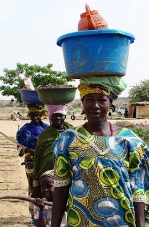
Worldwatch Says Innovation Is Key to Nourishing the Hungry
The Institute's State of the World report provides a roadmap for food security and agricultural investment, noting benefits for the planet on the way.
Worldwatch Institute's latest report, "Innovations that Nourish the Planet," spotlights successful agricultural innovations and unearths major successes in preventing food waste, building resilience to climate change, and strengthening farming in cities.
The report provides a roadmap for increased agricultural investment and more efficient ways to alleviate global hunger and poverty. Drawing from the world's leading agricultural experts and hundreds of innovations already working on the ground, the report outlines 15 proven, environmentally sustainable prescriptions.
The report is available through Nourishing the Planet's website for about $20.
"The progress showcased through this report will inform governments, policymakers, NGOs, and donors that seek to curb hunger and poverty, providing a clear roadmap for expanding or replicating these successes elsewhere," said Worldwatch Institute President Christopher Flavin. "We need the world's influencers of agricultural development to commit to longstanding support for farmers, who make up 80 percent of the population in Africa."
While investment in agricultural development by governments, international lenders and foundations has escalated in recent years, it is still nowhere near what's needed to help the 925 million people who are undernourished, according to a Worldwatch Institute press release.
"The international community has been neglecting entire segments of the food system in its efforts to reduce hunger and poverty," said Danielle Nierenberg, co-director of Worldwatch's Nourishing the Planet project. "The solutions won't necessarily come from producing more food, but from changing what children eat in schools, how foods are processed and marketed, and what sorts of food businesses we are investing in."
Serving locally raised crops to school children, for example, has proven to be an effective hunger- and poverty-reducing strategy in many African nations and has strong parallels to successful farm-to-cafeteria programs in the United States and Europe. Moreover, "roughly 40 percent of the food currently produced worldwide is wasted before it is consumed, creating large opportunities for farmers and households to save both money and resources by reducing this waste," according to Brian Halweil, Nourishing the Planet co-director.
The report's case studies and first-person examples include:
- In 2007, some 6,000 women in The Gambia organized into the TRY Women's Oyster Harvesting producer association, creating a sustainable co-management plan for the local oyster fishery to prevent overharvesting and exploitation. Oysters and fish are an important, low-cost source of protein for the population, but current production levels have led to environmental degradation and to changes in land use over the last 30 years. The government is working with groups like TRY to promote less-destructive methods and to expand credit facilities to low-income producers to stimulate investment in more-sustainable production.
- In Kibera, Nairobi, the largest slum in Kenya, more than 1,000 women farmers are growing "vertical" gardens in sacks full of dirt poked with holes, feeding their families and communities. These sacks have the potential to feed thousands of city dwellers while also providing a sustainable and easy-to-maintain source of income for urban farmers. With more than 60 percent of Africa's population projected to live in urban areas by 2050, such methods may be crucial to creating future food security.
- Pastoralists in South Africa and Kenya are preserving indigenous varieties of livestock that are adapted to the heat and drought of local conditions; these traits will be crucial as climate extremes on the continent worsen. Africa has the world's largest area of permanent pasture and the largest number of pastoralists, with 15 million to 25 million people dependent on livestock.
- Uganda's Developing Innovations in School Cultivation program is integrating indigenous vegetable gardens, nutrition information, and food preparation into school curriculums to teach children how to grow local crop varieties that will help combat food shortages and revitalize the country's culinary traditions. An estimated 33 percent of African children currently face hunger and malnutrition, which could affect some 42 million children by 2025.
The report also includes briefing documents, summaries, an innovations database, videos, and podcasts, all of which are available at www.NourishingthePlanet.org. The project's findings are being disseminated to a wide range of agricultural stakeholders, including government ministries, agricultural policymakers, farmer and community networks, and the increasingly influential non-governmental environmental and development communities.
The Worldwatch Institute and the Nourishing the Planet project are supported by the Bill and Melinda Gates Foundation and additional foundations, governments, and institutions including the Rockefeller and Surdna Foundations, the United Nations Foundation, the Goldman Environmental Prize, the Shared Earth Foundation, the Wallace Global Fund, the Winslow Foundation and many more.